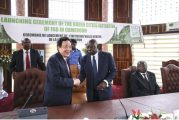Categories
Recent Posts
- Biya regime delays bond sale amid regional market strain
- Historic agreement between Nigeria and Cameroon to tackle wildlife crime
- Southern Cameroons refugees in Nigeria receive farm seedlings
- Douala: Investment Forum wraps up with honors for investment champions
- Understanding the Biya Francophone regime’s support for the Israeli genocide in Gaza
Archives
- April 2024
- March 2024
- February 2024
- January 2024
- December 2023
- November 2023
- October 2023
- September 2023
- August 2023
- July 2023
- June 2023
- May 2023
- April 2023
- March 2023
- February 2023
- January 2023
- December 2022
- November 2022
- October 2022
- September 2022
- August 2022
- July 2022
- June 2022
- May 2022
- April 2022
- March 2022
- February 2022
- January 2022
- December 2021
- November 2021
- October 2021
- September 2021
- August 2021
- July 2021
- June 2021
- May 2021
- April 2021
- March 2021
- February 2021
- January 2021
- December 2020
- November 2020
- October 2020
- September 2020
- August 2020
- July 2020
- June 2020
- May 2020
- April 2020
- March 2020
- February 2020
- January 2020
- December 2019
- November 2019
- October 2019
- September 2019
- August 2019
- July 2019
- June 2019
- May 2019
- April 2019
- March 2019
- February 2019
- January 2019
- December 2018
- November 2018
- October 2018
- September 2018
- August 2018
- July 2018
- June 2018
- May 2018
- April 2018
- March 2018
- February 2018
- January 2018
- December 2017
- November 2017
- October 2017
- September 2017
- August 2017
- July 2017
- June 2017
- May 2017
- April 2017
- March 2017
- February 2017
- January 2017
- December 2016
- November 2016
- October 2016
- September 2016
- August 2016
- July 2016
- June 2016
Featured
 Understanding the Biya Francophone regime’s support for the Israeli genocide in Gaza
Understanding the Biya Francophone regime’s support for the Israeli genocide in Gaza  Poverty under Biya: Cameroonians embrace Chinese language for brighter futures
Poverty under Biya: Cameroonians embrace Chinese language for brighter futures  Cameroon is broken: Who can fix it?
Cameroon is broken: Who can fix it?  Ethiopia: U.S Senator Cardin Statement on the Killing of Bate Urgessa
Ethiopia: U.S Senator Cardin Statement on the Killing of Bate Urgessa  Battle for the Unity Palace: ANNOUNCEMENT!
Battle for the Unity Palace: ANNOUNCEMENT!
Most Commented Posts
 4 Anglophone detainees killed in Yaounde
4 Anglophone detainees killed in Yaounde
19 comments Chantal Biya says she will return to Cameroon if General Ivo Yenwo, Martin Belinga Eboutou and Ferdinand Ngoh Ngoh are sacked
Chantal Biya says she will return to Cameroon if General Ivo Yenwo, Martin Belinga Eboutou and Ferdinand Ngoh Ngoh are sacked
13 comments Anglophone Nationalism: Barrister Eyambe says “hidden plans are at work”
Anglophone Nationalism: Barrister Eyambe says “hidden plans are at work”
12 comments The Anglophone Problem – When Facts don’t Lie
The Anglophone Problem – When Facts don’t Lie
12 comments Largest wave of arrest by BIR in Bamenda
Largest wave of arrest by BIR in Bamenda
10 comments
Latest Tweets
Error: access keys missing in Themify > Settings > Twitter SettingsFeatured
-

Biya regime delays bond sale amid regional market strain
-

Historic agreement between Nigeria and Cameroon to tackle wildlife crime
-

Southern Cameroons refugees in Nigeria receive farm seedlings
-

Douala: Investment Forum wraps up with honors for investment champions
-

Understanding the Biya Francophone regime’s support for the Israeli genocide in Gaza
-

US: Prosecution lays out ‘criminal conspiracy’ as Trump’s hush money trial opens
-

FAO formally launches Green Cities Initiative in Cameroon
© Cameroon Concord News 2024
10, March 2019
Cameroon and Nigeria Uproot Thousands from Safe Haven 0
An estimated 30,000 refugees have been uprooted by officials in Cameroon and Nigeria this month and sent to known hotbeds of insurgents including Boko Haram on the Nigerian side of the border.
Humanitarian groups including Action against Hunger are questioning the wisdom of forcing refugees to move to the city of Rann in Borno state, the epicentre of the decade-long insurgency that has killed more than 27,000.
“Reports from sources on the ground indicate that these people are in dire need of aid,” a UN briefing note stated.
There were also questions about whether the returns complied with international law on refugees, which require returns to be voluntary, the Agence France Press reported.
International and national humanitarian organizations abandoned Rann in January due to ongoing insecurity.
Shashwat Saraf, the country director of Action Against Hunger in Nigeria, said it was “difficult to imagine” it being safe for anyone to return. “Alarming” levels of severe acute malnutrition were found among children under five, he said.
The mass movement of internally displaced people comes as President Muhammadu Buhari takes office for a second term, having been declared the winner of February 23 national election marred by mechanical errors with the voter card readers, a weeklong postponement, reports of vote-buying, and extremist attacks in the northeast.
Voter turnout was at a historic low at 35.6 percent of the population.
“The numbers alone are indicting,” said Adewunmi Emoruwa of The Election Network. “We have witnessed a record number of cancelled votes – more than double the numbers from the previous poll – and which is only a reflection of the widespread irregularities across every part of the country. We all observed as thugs had a field day unleashing terror on demographically profiled voters, which led to the suppressed turnout that has been recorded.”
Buhari won in 19 states – including the two most populous, Lagos and Kano – while the opposition candidate, Atiku Abubakar, was victorious in 17.
The two men are both northern Muslims in their 70s who have long been in politics. Buhari is seen by many as a strict, inflexible but personally incorruptible figure, while many hoped Atiku, a wealthy businessman and former vice-president, would enact policies to help boost Nigeria’s struggling economy.
Source: Indepthnews.net